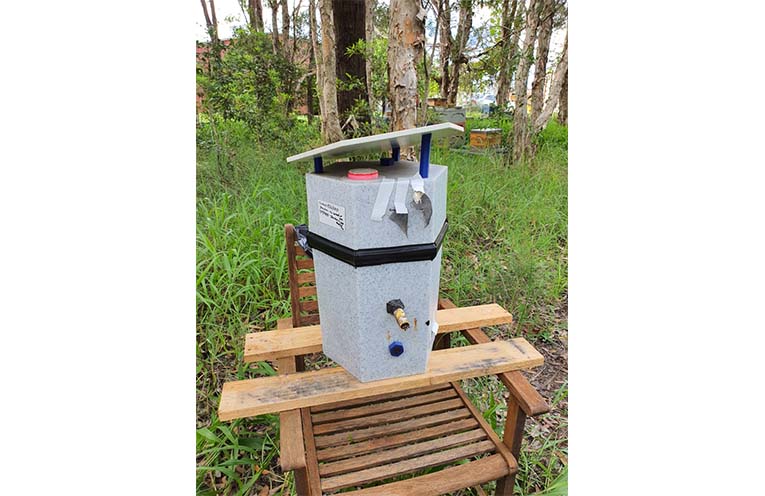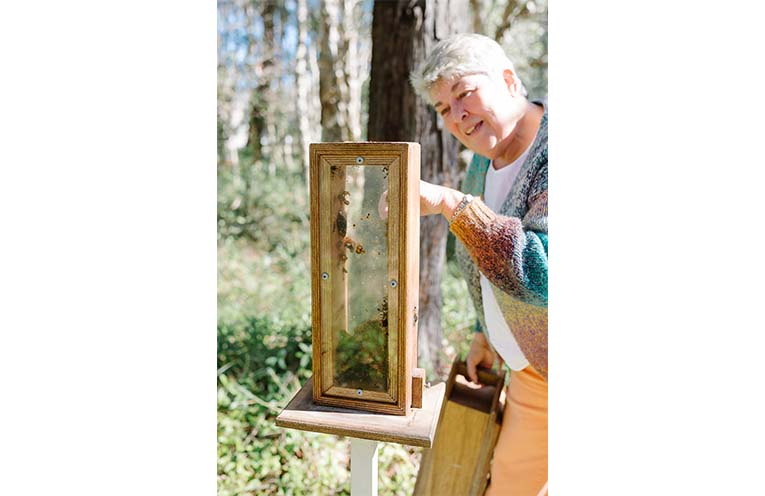
NATIVE stingless bee hives have become the target of theft along the Mid North Coast, leaving local beekeepers distraught.
While Police have been informed, the thefts have not been resolved, and beekeepers have started protecting their properties using surveillance methods.
 Advertise with News of The Area today.
Advertise with News of The Area today.It’s worth it for your business.
Message us.
Phone us – (02) 4981 8882.
Email us – media@newsofthearea.com.au
Dr Tobias Smith, a native bee researcher and commercial native beekeeper who resides on the Coffs Coast, said owners of stingless bees are turning to the use of tracking devices installed within hives.
“These are easily bought online, and while they add an added expense for beekeepers they offer an extra element of deterrence to theft or at least an increased chance of recovery should theft occur,” he said.
Elaine Bean, Chairperson of the Coffs Harbour branch of the Australian Native Bee Association (ANBA), told News Of The Area the worrying trend came to light after the theft of seven box hives from Clarence Native Bees Inc on a private property in West Coffs Harbour in October 2023.
“These hives were rescued when bush was cleared for the Coffs Harbour bypass and were destined to be donated to local schools, giving our kids an opportunity to learn about native bees through observation,” she said.
The North Coast Regional Botanic Gardens then reported the theft of a wild native bee colony in a log, alleged to have occurred sometime in February/March 2024.
“This colony had been discovered in the gardens during maintenance works and was left in situ.
“Although it was in a shaded spot, it was thriving.
“People in the community who knew the location of the hive enjoyed visiting the gardens and seeing the bees on a regular basis.”
Woolgoolga Regional Community Gardens had one of its hives stolen in May 2024.
“Woolgoolga Community Gardens first acquired a Tetragonula carbonaria (native stingless bee) hive approximately five years ago,” Tony Reed of Woolgoolga Community Gardens told NOTA.
“This hive, the second, was donated by a member of the Gardens a couple of years ago and has become a strong viable hive since being moved here.”
Tony said the bee hives are an important part of the Gardens, providing pollination for fruit, vegetables and flowers, and serving as an educational resource.
“Many people don’t know about native bees and are so surprised when it’s explained to them about their life cycle and how they differ so much to the honeybee most people know.”
The hive was noticed missing on a routine weekly check, so it’s not known exactly when the hive was taken.
The bracket and the hive were forcefully wrenched from the tree it was in.
“As expected, the reaction from the membership of the Gardens and wider public is one of shock and dismay that the hive was not only stolen but it was stolen from a community garden, a garden that belongs to us all,” he said.
Coffs Beekeeping Supplies also had three native bee hives stolen in May 2024.
Proprietor of the business, Judith Webster, reported the incident to the police as soon as it was discovered.
“The premises is kept locked when not open for business and is enclosed with a wire fence with three strands of barbed wire along the top.
“The back fence line borders onto the creek line with bush, and a mowed path.
“There is some evidence of damage to the barbed wire above the rear gate,” Judith said in her police report.
Judith estimates the value of the three hives to be around $2,400.
“These hives were more valuable because of the unusual nature of each hive,” she said.
Dr Tobias Smith highlighted steps beekeepers can take to protect their hives.
“As interest in stingless bees and stingless beekeeping has grown, unfortunately theft of hives has also become a regular occurrence.
“Beekeepers should position their bee hives with theft avoidance/deterrence in mind,” he said.
In addition to theft of hives from beekeepers, there is also the illegal extraction of stingless bee colonies from the wild, both from private land and from protected areas.
This presents a threat to the conservation of these bees, and other components of biodiversity.
“People purchasing stingless bee hives should question sellers on the origins of the stingless bee colonies being sold, and in particular enquire in detail about the origins of colonies sold in logs,” Dr Smith said.
The Coffs Harbour branch of the Australian Native Bee Association are asking people to exercise caution when buying native bee hives, especially if buying a colony in a log.
“It is vital that buyers ask questions of sellers relating to the origin and history of hives.
“We encourage people who have experienced hive theft or have information about hive thefts to contact the Police,” Visit www.anba.org.au.
By Andrea FERRARI

